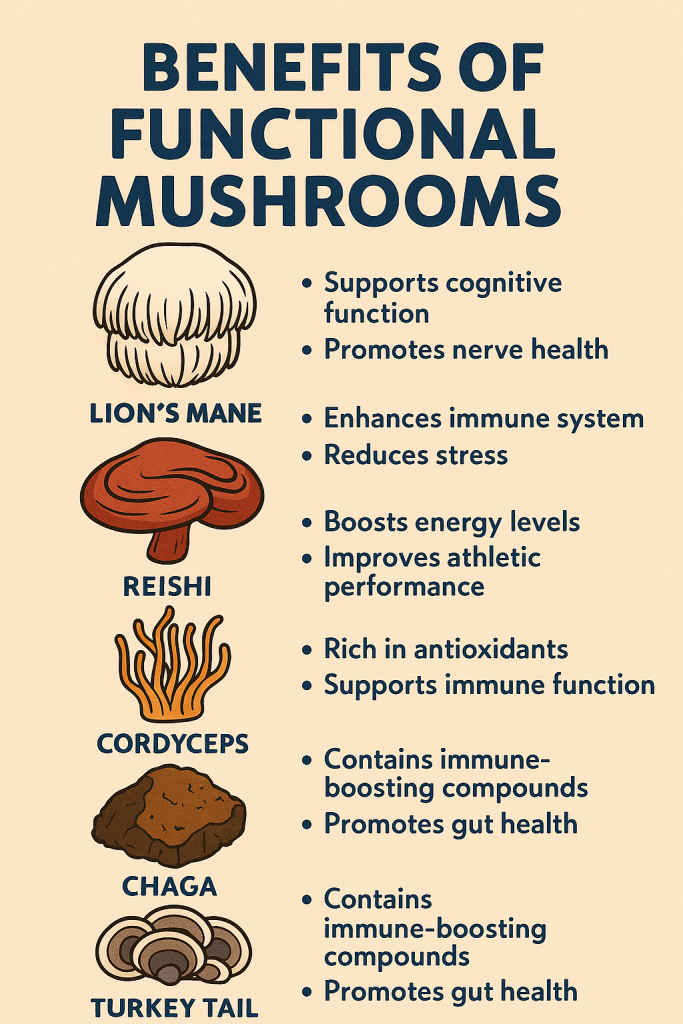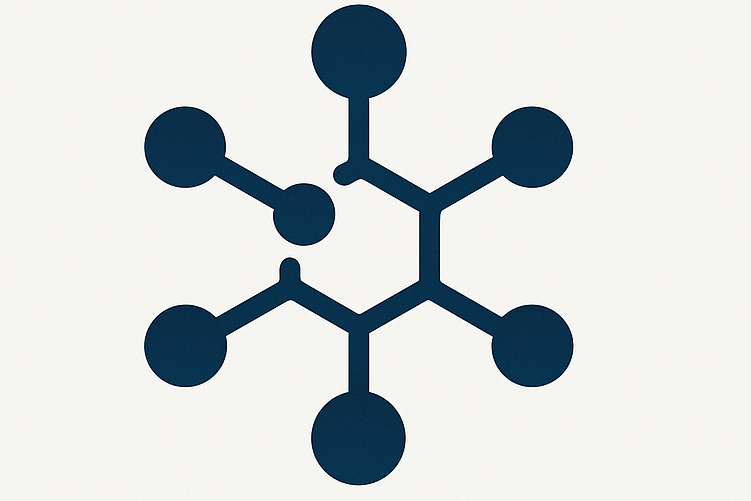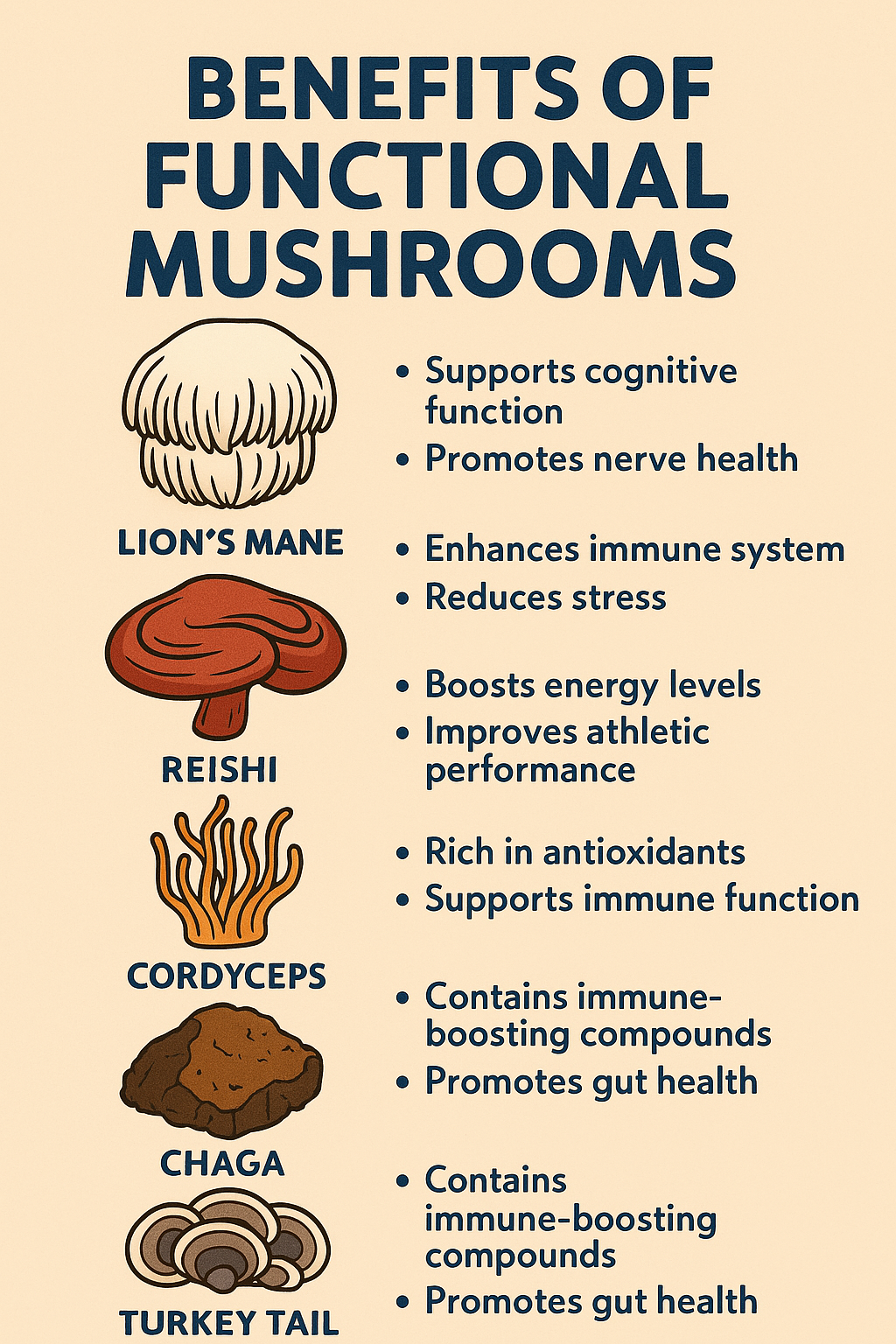Nootropic Mushroom Benefits: Enhancing Cognitive Function Naturally
Nootropic mushrooms have gained attention for their potential to boost cognitive function.
These mushrooms, such as lion’s mane and reishi, are believed to enhance memory, focus, and mental clarity.
Nootropic mushrooms may support mental health by potentially reducing stress and anxiety, making them a popular choice for those seeking natural brain support.

Lion’s mane is one prominent example, often praised for its ability to support nerve health and possibly combat cognitive decline.
Additionally, some studies suggest these mushrooms might even support mood improvement by promoting a sense of well-being. More information about the benefits of lion’s mane mushrooms can be found in its health benefits.
Adaptogenic mushrooms are another category that might help the body adapt to stress, potentially enhancing one’s resilience to daily challenges.
These claims are supported by various studies and user experiences, making nootropic mushrooms a subject of interest for those exploring natural ways to boost cognitive performance. Learn more about these adaptogenic mushrooms and their benefits.
Understanding Nootropics

Nootropics, often called “smart drugs,” are substances that enhance brain function.
These substances are popular among health enthusiasts and those seeking improved cognitive performance.
Defining Nootropics
Nootropics are substances that are believed to improve cognitive functions such as memory, creativity, and motivation. They are commonly used by individuals aiming to enhance their mental performance.
While some nootropics are synthetic, many natural options exist, such as certain types of mushrooms. The term applies broadly, encompassing a wide range of substances with varying effects.
Nootropics are popular with memory and focus enthusiasts for unlocking potential. However, it is vital to research and understand these substances before use. Medicinal mushrooms are gaining attention as effective nootropics.
History and Evolution
Nootropics date back to ancient times when natural herbs and plant extracts were used to enhance mental clarity.
Modern interest in nootropics began in the mid-20th century when scientists developed synthetic compounds aimed at improving brain health.
Over the decades, the study of nootropics has expanded, leading to a deeper understanding of how they work. Today, they are used in various communities, from students to professionals seeking a cognitive edge. This evolution reflects a growing trend among health enthusiasts to use nootropics for better mental health.
Types of Nootropic Mushrooms
Nootropic mushrooms are known for their potential to support brain health and cognitive function. Each type of mushroom is unique, offering a variety of compounds that may benefit the brain and body in different ways.

Lion’s Mane Mushroom
Lion’s Mane Mushroom is known for its potential to boost cognitive function and memory. It contains compounds that may stimulate nerve growth factor (NGF), which is important for the health of neurons.
This mushroom is often used to support mental clarity and focus.
Its potential to encourage nerve repair makes it a popular choice among those seeking to enhance brain health. Some users report noticeable improvements in attention and concentration after incorporating Lion’s Mane into their routine.
It may also offer antioxidant and anti-inflammatory properties, which could help protect against age-related cognitive decline. People interested in maintaining their brain health may find Lion’s Mane useful.
Chaga Mushroom
Chaga is often revered for its immune-boosting properties. It grows on birch trees and contains high levels of antioxidants. These antioxidants help fight oxidative stress, which can contribute to cognitive decline.
Chaga is also rich in polysaccharides, which may help modulate the immune system.
This mushroom is a popular ingredient in teas and supplements, providing overall wellness support.
While not as directly associated with cognitive enhancement as Lion’s Mane, Chaga’s ability to reduce inflammation might indirectly support brain health. Its benefits extend beyond just mental wellness.
Cordyceps Mushroom
Cordyceps Mushroom is famous for its energy-boosting properties. It is often used by athletes for its potential to enhance stamina and reduce fatigue.
This mushroom may improve oxygen uptake and increase production of adenosine triphosphate (ATP).
These benefits can indirectly support brain function by increasing alertness and reducing mental fatigue. Cordyceps also has anti-inflammatory properties, which might play a role in brain health.
It’s a versatile mushroom with applications in physical performance and mental clarity, making it valuable for anyone looking to enhance their cognitive energy and endurance.
Turkey Tail Mushroom
Turkey Tail Mushroom is known for its potential to support the immune system. It contains polysaccharopeptides, which may boost immune response.
This mushroom is often explored for its role in supporting overall health.
Although primarily linked to immune support, Turkey Tail also offers antioxidant properties. This can help protect brain cells from damage caused by oxidative stress.
Turkey Tail is typically used in supplements and teas, providing both immune and wellness benefits.
Cognitive Benefits
Nootropic mushrooms are gaining attention for their potential cognitive benefits. These mushrooms, including lion’s mane, may help with memory enhancement, improved focus, and overall cognitive performance.
Memory Enhancement
Lion’s mane mushrooms are known for their potential to boost memory. They contain compounds called hericenones and erinacines, which may stimulate brain cell growth.
These compounds help form new connections in the brain, which can enhance memory. Some studies suggest regular consumption can improve mild cognitive impairment, especially in older adults, by offering protection against memory loss.
For those experiencing age-related memory challenges, incorporating lion’s mane could be beneficial. The mushrooms have also been linked to potentially reducing symptoms of conditions like dementia through their nerve-protecting properties.
Improved Focus
Improving focus is another potential benefit of nootropic mushrooms.
Lion’s mane may reduce anxiety and depression symptoms, which can contribute to better attention and concentration.
By supporting mental clarity and reducing distractions, these mushrooms help individuals maintain better focus in tasks that require high attention to detail or prolonged concentration.
Focus enhancement from lion’s mane might be helpful for people in demanding cognitive fields or anyone needing sharper mental acuity. Those interested in natural supplements for sharpening focus might consider adding lion’s mane to their routine for a sustained attention boost.
Cognitive Performance
Cognitive performance encompasses memory, focus, and overall mental function. Nootropic mushrooms are being researched for their ability to support brain health and performance.
Lion’s mane, in particular, shows potential in enhancing nerve growth and brain cell development, which can lead to better cognitive function.
Regular consumption can support various brain functions, potentially leading to better problem-solving skills and mental processing speed. Many people in intellectually demanding roles seek these benefits to maintain high performance levels. For those seeking a natural aid for cognitive enhancement, nootropic mushrooms offer a promising option.
Physical Health Benefits
Nootropic mushrooms, like lion’s mane and cordyceps, offer several physical health benefits. They support the immune system and have anti-inflammatory properties, providing a natural way to boost overall health.
Immune System Support
Nootropic mushrooms contain compounds that strengthen immune support. For instance, lion’s mane mushrooms are a source of antioxidants.
These help to protect the body’s cells from damage, promoting better health.
Another element found in nootropic mushrooms is beta-glucans. These complex sugars enhance the immune response, making it more efficient at fighting off illnesses.
Some studies have suggested that these mushrooms may help reduce mild anxiety and depression, indirectly supporting the immune system by reducing stress.
Mushrooms such as reishi are known for their immune-boosting properties as well. They help to regulate the immune system, potentially improving resilience against infections.
Anti-inflammatory Properties
Nootropic mushrooms also have notable anti-inflammatory benefits. Compounds found in these mushrooms help decrease inflammation, which is linked to various health problems.
By reducing inflammation, they may improve conditions like arthritis.
Cordyceps mushrooms are known for their potential ability to increase oxygen flow and reduce fatigue, which may aid in faster recovery after physical activity. This, combined with their anti-inflammatory properties, can result in improved overall stamina and endurance.
Furthermore, reducing inflammation helps in maintaining a healthy cardiovascular system. This benefit makes nootropic mushrooms a supportive addition for individuals looking to improve physical health naturally.
Nootropic Delivery Methods
Understanding how to consume nootropic mushrooms effectively can make a difference in how they work. Each method offers unique benefits and considerations. Here’s a look at two common delivery methods: capsules or powders, and teas and elixirs.
Capsules vs. Powders
Capsules and powders are popular for those seeking control over dosages.
Capsules provide a convenient way to consume nootropic mushrooms without the need to measure. Each capsule typically contains a pre-measured amount, ensuring consistency in daily intake, which suits people with busy lifestyles. They are often preferred for their ease of use and neutral taste, making them ideal for those who dislike the flavor of mushrooms.
On the other hand, powders offer flexibility and may be more cost-effective.
Users can customize their dosage by increasing or decreasing the amount of powder consumed. Powders can be easily mixed into smoothies, coffee, or yogurt, giving users the freedom to incorporate them into various meals. This method of delivery suits those who enjoy experimenting with their food and drink combinations.
Teas and Elixirs
Teas and elixirs are favored for their holistic experience and often serve as a soothing ritual.
Creating a tea with nootropic mushrooms offers a warm, pleasant way to enjoy these benefits. Mushroom teas can include additional herbs or spices like ginger or cinnamon, which not only enhance the taste but may also provide complementary health benefits.
Elixirs, which often combine mushrooms with other adaptogens, offer a robust mix of functional ingredients, providing a comprehensive wellness experience. They usually come in single-serving packets or bottles, making them easy to consume on the go. Both teas and elixirs are appreciated for their calming properties and ability to integrate seamlessly into daily routines.
Safety and Dosage
Determining the proper dosage and understanding any potential side effects are crucial when using nootropic mushrooms like lion’s mane. Correct usage ensures both safety and effectiveness.
Recommended Dosages
For lion’s mane mushrooms, the dosage can vary based on the form of the supplement.
Lion’s mane is commonly available in capsules, powders, and even teas. For most adults, a daily dosage of 250 to 500 milligrams in capsule form is often recommended. Some prefer to use powdered lion’s mane, which can be mixed into drinks or foods. A typical dose might range from 2 to 3 grams per day.
It’s important to start with a lower dose when trying a new supplement. Gradually increasing the amount allows the body to adjust and helps monitor how it affects the individual. For personalized advice, consulting with a healthcare professional or a knowledgeable practitioner is always a good step, particularly for those with underlying health conditions.
Potential Side Effects
Lion’s mane mushrooms are generally considered safe for most people. There are few reported side effects, which makes them popular in the wellness community.
Some individuals may experience digestive discomfort, such as an upset stomach or mild bloating, especially when beginning supplementation.
Rare allergic reactions might occur, presenting as skin rashes or itching. It’s critical to discontinue use and consult a healthcare provider if any adverse reactions are noted. Pregnant or breastfeeding women should exercise caution and seek medical advice before adding lion’s mane to their routine to avoid any potential complications.
Research and Studies
The benefits of nootropic mushrooms, particularly for cognitive function, have been the subject of various scientific investigations. Key findings suggest improvements in mental performance and stress reduction thanks to compounds like beta-glucans.
Scientific Evidence
Research on nootropic mushrooms shows promising results.
For instance, lion’s mane mushrooms are known for potentially improving cognitive function. A study noted that in adults aged 50-80, regular intake of the mushroom resulted in improvements in mild cognitive impairment scores over 16 weeks.
Moreover, animal studies reveal these mushrooms may enhance fat metabolism and lower triglyceride levels. Additionally, the presence of compounds like beta-glucans not only boosts immunity but also supports brain health by promoting nerve growth.
Ongoing Research
Current investigations are focused on understanding more about the effects of these mushrooms.
Researchers are exploring how lion’s mane, along with other adaptogenic mushrooms, may help reduce stress in the body.
The impact of beta-glucans in neuroprotection and stress adaptation is under study.
With growing interest, future studies aim to provide more concrete evidence on the mental health benefits, especially in areas related to stress and cognitive enhancement.
The goal is to establish a stronger scientific consensus through further trials and research.
Final Thoughts
Nootropic mushrooms offer unique benefits for brain health and cognitive function.
Lion’s Mane, for example, is highlighted for its potential to enhance memory, focus, and mental clarity. These properties make it a popular choice among those looking to boost their mental performance and protect against cognitive decline.
Nootropic mushrooms are also packed with essential nutrients.
Lion’s Mane mushrooms contain vitamins like thiamine, riboflavin, and niacin. Additionally, they provide important minerals such as manganese and zinc, supporting overall wellness.
Potential Health Benefits:
- Improved Memory: Helps in enhancing memory and learning.
- Anxiety Relief: May reduce mild symptoms of anxiety and depression.
- Cognitive Function: Supports better focus and concentration.
Nootropic mushrooms are generally safe, but it’s important to consult a healthcare professional before adding them to your diet.
Some individuals may experience side effects, so monitoring your body’s reaction is crucial.
Integrating these mushrooms into daily routines can be simple.
They can be consumed in various forms, such as capsules, powders, or teas, making it easy to enjoy their potential benefits. By incorporating them thoughtfully, individuals can explore the potential that nootropic mushrooms like Lion’s Mane have to offer.






